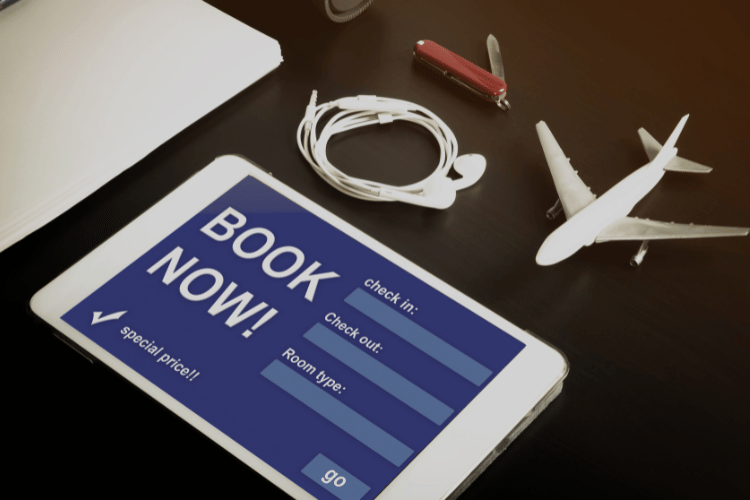
A Comprehensive Introduction to Hotel Channel Managers
A hotel channel manager is a software solution used by hotels and other accommodation providers to streamline the management of their distribution channels. It helps them reach a wider audience, increase bookings, and optimize revenue by connecting their property to multiple online travel agencies (OTAs), metasearch engines, and other booking platforms.
Hotel channel management software allows hoteliers to manage rates, availability, and reservations across various channels from a single, centralized interface. Learn all you need to know about a hotel channel manager in this in-depth guide!
Contents
- What is a hotel channel manager?
- The key features and benefits of hotel channel management software:
- Examples of a channel manager software
- Key statistics about the channel management market
- Key trends in distribution channels in the hospitality industry
- 8 steps to implement a channel manager
- Pros and cons of a hotel channel manager
- How to select a hotel channel manager
What is a hotel channel manager?
A hotel channel management software is an essential tool for hoteliers looking to efficiently manage their distribution channels, optimize revenue, and enhance their online presence. By automating and centralizing key processes, it reduces manual effort, minimizes errors, and helps hoteliers make data-driven decisions about their distribution strategies and hotel inventory management.
The key features and benefits of hotel channel management software:
Centralized inventory management
A channel manager simplifies the process of managing room inventory across multiple booking platforms. It automatically updates room availability, rates, and restrictions across all connected channels, eliminating the need for manual updates and reducing the risk of overbooking or double-booking.
Real-time updates
The software synchronizes data in real-time, ensuring that any changes made to room rates, inventory, or restrictions are instantly reflected across all channels. This helps hoteliers react quickly to market changes and maximize revenue opportunities.
Rate management
Channel managers allow hoteliers to set up and manage pricing strategies across multiple channels. They can create and apply different rate plans, promotions, and discounts to attract diverse customer segments and boost bookings.
Performance analytics
Many channel managers provide built-in analytics tools that help hoteliers track their performance across different channels. By analyzing data such as booking trends, channel performance, and revenue, hoteliers can make informed decisions about their distribution strategies.

Integration with property management systems (PMS)
Channel managers often integrate with PMS, enabling seamless communication between the two systems. This integration allows for automatic updates on reservations, guest information, and billing, resulting in better overall efficiency and guest experience.
Channel selection and prioritization
Hoteliers can choose from a wide range of distribution channels, including OTAs, global distribution systems (GDS), and direct booking platforms. Some channel managers also allow hoteliers to prioritize channels based on their performance or target audience.
Support and training
Reputable channel management software providers offer comprehensive support and training to ensure hoteliers can effectively utilize the system and its features.
[Read also: Yield Management: What It Is and The Best Strategies]

Examples of a channel manager software
We collected a list of popular channel management software solutions along with a brief description of each below. Keep in mind that usage statistics are subject to change and may not be up-to-date, as these numbers can vary over time due to the dynamic nature of the travel and hotel industry itself.
SiteMinder
SiteMinder is a widely-used channel management technology solution that connects hotels to numerous distribution channels, like OTAs, travel metasearch engines, and direct booking platforms. It offers real-time updates, a user-friendly interface, and integration with various property management systems (PMS). As of 2021, SiteMinder had over 35,000 hotel customers in more than 160 countries.
Cloudbeds
Cloudbeds is a comprehensive hospitality management software suite that includes a channel manager, property management system, and booking engine. The Cloudbeds channel manager connects hotels to over 300 distribution channels and offers real-time updates, centralized inventory management, and reporting features. By 2021, Cloudbeds served over 22,000 properties in more than 157 countries.
STAAH
STAAH is another popular channel management software that provides real-time updates, rate management, and integration with various PMS. The platform supports connections to over 200 distribution channels and offers performance analytics tools for data-driven decision-making. STAAH had over 10,000 customers across 90+ countries as of 2021.
eZee Centrix
eZee Centrix is a full channel manager for hotels that offers features like real-time updates, centralized inventory management, rate management, and analytics. It connects hotels to 100+ global and regional OTAs and other booking platforms. As of 2021, eZee Technosys, the company behind eZee Centrix, had a client base of over 14,000 customers in 160+ countries.
RateTiger
RateTiger, developed by eRevMax, is a hotel channel management software that supports real-time updates, rate management, and integration with PMS. The platform connects hotels to over 450 OTAs, GDS, metasearch engines, and other booking channels. RateTiger served thousands of hotels worldwide as of 2021.
[Read also: How to Choose the Best Travel Agency Software to Maximize Your Revenue]

These are just a few examples of channel management software used by hotels and accommodation providers. Usage statistics can change over time due to market fluctuations, new entrants, and evolving customer preferences. It’s essential for hoteliers to research and choose a solution that best fits their specific needs, taking into account factors like features, pricing, and integration capabilities.
Key statistics about the channel management market
The channel management market is dynamic and constantly evolving and whilst some metrics mentioned here might quickly become outdated, these statistics can still provide some insights into the general trends in the channel management market:
Market size and growth
The global hotel channel management software market has witnessed significant growth in recent years, driven by the increasing adoption of technology in the hospitality industry and the growing demand for online bookings. In 2020, the global hotel channel management software market size was valued at approximately USD 235 million. The market is expected to grow at a compound annual growth rate (CAGR) of around 13.8% from 2021 to 2028, reaching a value of approximately USD 600 million by 2028.
Regional trends
The North American region is expected to hold the largest market share in the hotel channel management software market, thanks to the high adoption of advanced technology in travel industry and a large number of hotels and accommodation providers. Europe and the Asia-Pacific region are also witnessing significant growth in channel management software adoption, driven by the expanding tourism industry and increasing internet penetration.
Key drivers
The growing demand for real-time updates, increased competition in the hospitality industry, and the need for efficient channel management solutions are some of the main factors driving the growth of the hotel channel management software market. Additionally, the increasing use of mobile devices and social media platforms for travel planning and booking has also contributed to the market’s expansion.
Challenges
Despite the growth in the hotel channel management software market, there are challenges such as data security and privacy concerns, high initial setup costs, and the need for continuous training and support. The COVID-19 pandemic also had a significant impact on the hospitality industry, affecting the market dynamics and demand for channel management solutions in the short term.
Market players
The hotel channel management software market is fragmented, with several key players offering various solutions catering to different customer needs. Some of the leading players in the hotel management software market include SiteMinder, Cloudbeds, STAAH, eZee Centrix, RateTiger, and others.
These key statistics provide an overview of the channel management market, its growth potential, regional trends, and challenges.
[Read also: Best travel management solutions]

Key trends in distribution channels in the hospitality industry
The hospitality industry has seen significant changes in distribution channels over the years, driven by advances in technology, evolving customer preferences, and the competitive landscape.
Here are some key trends in distribution channels in the hospitality industry:
1. Growth of online travel agencies (OTAs)
OTAs such as Booking.com, Expedia, and Agoda have become increasingly popular among travelers for their convenience, wide range of options, and competitive pricing for hotel rooms. Many hotels rely on online travel agencies (OTAs) to increase their online visibility and reach a broader audience. However, the high commission fees charged by OTAs have led some hotels to focus on driving direct bookings.
2. Emphasis on direct bookings:
Hotels are increasingly investing in their websites and hotel booking engines to encourage direct bookings, which often provide higher profit margins compared to OTA bookings. By offering loyalty programs, exclusive discounts, and personalized experiences, hotels aim to create stronger relationships with their guests and reduce their dependence on OTAs.

3. Rise of metasearch engines
Metasearch engines like Google Hotel Ads, Trivago, and Kayak aggregate rates and availability from multiple booking sites and channels, allowing users to compare prices and find the best deals. This trend has led hotels to ensure their presence on metasearch platforms and optimize their rate strategies to stay competitive.
4. Mobile and app-based bookings
With the widespread use of smartphones and mobile apps, travelers are increasingly booking their accommodations through mobile devices. To cater to this trend, hotels are optimizing their websites for mobile devices, developing dedicated mobile apps, and offering mobile-exclusive discounts and promotions.
5. Social media as a distribution channel
Social media platforms such as Facebook, Instagram, and Pinterest have become important marketing and distribution channels for hotels. By creating engaging content and leveraging social media.
[Read also: Digital transformation in the travel and tourism industry]

8 steps to implement a channel manager
Implementing a channel manager system can be a complex process that requires careful planning, coordination, and ongoing monitoring.
By following these steps, you can set up a channel manager that helps you efficiently manage your distribution channels, increase bookings, and optimize revenue:
1. Choose a channel manager
Research and evaluate various channel management software options based on factors such as features, pricing, integration capabilities, and customer support. Choose the one that best fits your needs and budget.
2. Sign up and create an account
Once you’ve selected a channel manager, sign up for the service and create an account. You might need to provide details about your property, such as name, address, and contact information.
3. Integration with Property Management System (PMS) or Central Reservation System (CRS)
An advanced channel manager can integrate with PMS or CRS, streamlining the process of managing reservations, guest information, and billing. Check if the chosen hotel channel manager software supports integration with your existing PMS or CRS, and follow the integration process provided by the software vendor.
4. Map room types and rates
Set up your room types, rate plans, and inventory in the channel manager. This might involve defining room categories, pricing strategies, and any applicable restrictions. Make sure the information is consistent with your PMS or CRS.
5. Connect to distribution channels
Choose the distribution channels you want to connect to, such as OTAs, metasearch engines, and direct booking platforms. You might need to establish accounts with these channels if you haven’t already done so. Follow the channel manager’s instructions for connecting to each channel, which may involve API integrations connected booking sites, mapping room types and rates, and synchronizing inventory.
6. Configure and test connections
After connecting your hotel’s property management system to the desired distribution channels, test the connections to ensure they are functioning correctly. Verify that room availability, rates, and restrictions are accurately reflected on each channel, and that reservations are correctly imported into your PMS or CRS.
7. Monitor and optimize performance
Use the channel manager’s reporting and analytics tools to track your property’s performance across different sales channels. Analyze the data to identify trends, optimize pricing strategies, and prioritize channels based on their performance.
8. Training and support
Ensure your staff members are trained to use the channel manager effectively. Take advantage of any training resources and customer support offered by the software vendor, such as webinars, documentation, or dedicated support teams.

Pros and cons of a hotel channel manager
Benefits of using a channel manager
Using a channel manager can significantly enhance the efficiency of managing distribution channels, increase bookings, and optimize revenue for hotels and accommodation providers.
It also helps to streamline operations, improve guest satisfaction, and enable data-driven decision-making. Some of the key advantages include:
Centralized inventory management
A channel manager allows you to manage room inventory across hotel website and multiple booking platforms from a single, centralized interface. This helps to streamline the process of updating room availability, rates, and restrictions, saving time and effort.
Real-time updates
Channel managers synchronize data in real-time, ensuring that any changes made to room rates, inventory, or restrictions are instantly reflected across all connected channels. This helps reduce the risk of overbooking or double-booking and allows you to react quickly to market changes.
Expanded market reach
Connecting to multiple distribution channels, such as OTAs, metasearch engines, and direct booking platforms, helps to increase your property’s online visibility and reach a wider audience. This can lead to more bookings and higher occupancy rates.
Rate management
Channel managers enable you to set up and manage pricing strategies across different channels. You can create and apply various rate plans, promotions, and discounts to attract different customer segments and boost bookings.
Performance analytics
Many channel managers provide built-in analytics tools that help you track your property’s performance across different channels. By analyzing data such as booking trends, channel performance, and revenue, you can make informed decisions about your distribution strategy and prioritize channels based on their performance.
Integration with property management systems (PMS)
Channel managers often integrate with PMS, enabling seamless communication between the two systems. This integration allows for automatic updates on reservations, guest information, and billing, resulting in better overall efficiency and an improved guest experience.
Improved revenue management
By providing real-time data and analytics, channel managers can help you optimize your hotel revenue management strategies. You can adjust pricing and availability based on demand, competition, and other factors to maximize revenue opportunities.
Time and cost savings
Automating and centralizing key processes with a channel manager can reduce manual effort, minimize errors, and save time. This allows your staff to focus on other important tasks, such as guest service and property management.

Risks associated with channel managers
To minimize the risks associated with implementing channel management software, it’s essential to carefully research and choose a reputable software provider that offers robust security features, reliable performance, and comprehensive support. Additionally, investing in staff training and maintaining a balanced distribution strategy can help ensure a successful implementation and maximize the benefits of using a channel manager.
While implementing a channel management software offers numerous benefits, there are potential risks and challenges that hotels and accommodation providers should consider:
Integration issues
Integration with existing Property Management Systems (PMS) or Central Reservation Systems (CRS) can be complex and may require technical expertise. If the channel manager is not compatible with your current systems, you may encounter difficulties in synchronizing data, which could lead to errors and inefficiencies.
Data security and privacy concerns
Handling sensitive guest information and payment details requires robust security measures to prevent data breaches and protect privacy. It’s essential to evaluate the security features of the channel management software and ensure compliance with data protection regulations, such as the General Data Protection Regulation (GDPR).
High setup and maintenance costs
The initial setup and ongoing subscription fees for channel management software can be expensive, especially for small and medium-sized hotels. It’s crucial to evaluate the potential return on investment (ROI) and ensure the software fits within your budget.
Staff training and adaptation
The successful implementation of a channel manager requires adequate training and support for your staff to ensure they can effectively use the software. This may involve time and resource investment, and some employees may face challenges adapting to the new system.
Over-reliance on OTAs
While channel managers can help expand your market reach through connections with various OTAs, an overreliance on these channels can result in high commission fees and reduced control over pricing and guest relationships. It’s essential to maintain a balanced distribution strategy across online channels, including direct bookings.
Technical glitches and downtime
Channel management software, like any other technology, may experience technical issues or downtime, which can disrupt your operations and affect guest satisfaction. Choose a software provider with a solid reputation for reliability and responsive customer support to mitigate these risks.
Inaccurate inventory and rate updates
Real-time updates are crucial for preventing overbooking and ensuring accurate information across all channels. However, technical issues or human errors can lead to discrepancies in rates, availability, or restrictions. Regular monitoring and prompt resolution of any discrepancies are essential to avoid potential issues.

How to select a hotel channel manager
Selecting the right hotel channel manager is crucial for efficiently managing your distribution channels and optimizing your hotel’s online presence.
Here are 11 steps and factors to consider when choosing a hotel channel manager:
1. Evaluate your needs
Before selecting a channel manager, identify your hotel’s specific needs and goals. Consider factors such as the size of your property, the target audience, the distribution channels you want to connect with, and the level of integration required with your existing systems.
2. Research available options
Explore different channel management software solutions on the market. Compile a list of potential options based on their features, pricing, and reputation.
3. Check compatibility with your Property Management System (PMS) or Central Reservation System (CRS)
Ensure the channel manager you select is compatible with your existing PMS or CRS to enable seamless integration and data synchronization.
4. Distribution channels
Verify that the channel manager connects to the distribution channels that are most relevant to your property, such as global and regional OTAs, metasearch engines, and direct booking platforms.
5. Features and functionality
Assess the features offered by each channel manager, including real-time inventory updates, rate management, reporting and analytics, and support for multiple languages and currencies.
6. Ease of use
Look for a good channel manager, with a user-friendly interface and an intuitive design, which will make it easier for your staff to see how many channels to learn and use the system effectively.
7. Scalability
Choose a channel manager that can grow with your business, allowing you to add new channels, properties, or features as needed.
8. Customer support
Evaluate the level of customer support provided by each channel manager, including the availability of training resources, dedicated support teams, and responsive communication channels.
9. Reviews and testimonials
Read customer reviews and testimonials to gain insight into the experiences of other hoteliers who have used the hotel channel manager system. This can help you identify potential issues or challenges and gauge the overall quality of the software.
10. Pricing and return on investment (ROI)
Compare the pricing models of different channel managers, including any setup fees, monthly or annual subscription costs, and commission rates. Consider the potential ROI and ensure the chosen solution fits within your budget.
11. Request a demo or trial
Before making a final decision, request a demo or trial of the best channel manager, to test its features and functionality. This will help you determine if the software meets your requirements and is easy to use for your staff.

Final words
Hotel channel managers have emerged as a powerful tool for hotels and accommodation providers to streamline their distribution strategies, optimize revenue, and reach a broader audience.
As the hospitality landscape becomes increasingly competitive and technology-driven, implementing a channel manager tailored to your property’s specific needs can significantly enhance your online presence and improve operational efficiency.
By carefully researching and selecting the right channel manager, investing in staff training, and continuously monitoring performance, hoteliers can effectively navigate the ever-evolving world of online distribution and position themselves for success in this dynamic industry.
Related Posts
We are Stratoflow, a custom travel software development company. We firmly believe that software craftsmanship, collaboration and effective communication is key in delivering complex software projects. This allows us to build advanced high-performance Java applications capable of processing vast amounts of data in a short time. We also provide our clients with an option to outsource and hire Java developers to extend their teams with experienced professionals. As a result, our Java software development services contribute to our clients’ business growth. We specialize in building bespoke travel solutions like fast search engines, metasearch engines, booking engine services or channel manager integrations.